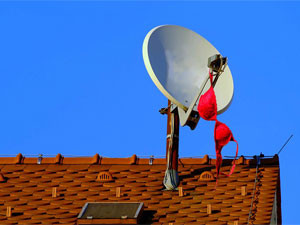
Ailing pay-TV broadcaster StarSat, and its parent company On Digital Media (ODM), could be in for more pain as the Western Cape High Court is set to hear a challenge next Tuesday to the company's right to air adult content.
The Justice Alliance of SA (JASA) filed papers in the High Court in November last year, challenging the Independent Communication Authority of SA's decision, in April last year, to allow StarSat to broadcast pornography channels on TV after 8pm. JASA says its bid is supported by applications brought by Cause for Justice and Doctors for Life.
"JASA believes that it is a step too far to introduce pornography to the family TV, which is usually in the only living room in the home. Inevitably, children will be aware of it even if parents attempt to prevent them watching. The 8pm watershed period is absurd, because teenage children settle down to watch TV at that time after doing their homework," the organisation says in a statement.
The Cape Town-based NGO alleges ICASA erred "in failing to find that the constitutional rights of children were laws of general application, which should have trumped the rights to freedom of expression".
Hard to compete
There is currently much speculation about whether ODM has actually achieved any measure of success with its three pornography offerings - Playboy TV, Desire TV and Private Spice - which started airing in November as a standalone StarSat sex TV package, at a subscription fee of R159 per month.
The adult content offering was but one measure taken by ODM - which started challenging for a slice of the pay-TV market about four years ago - to survive in a far more anticompetitive landscape than it anticipated. The company also rebranded from TopTV to StarSat, as part of a business rescue plan, has offered customers a prepaid option, and has sporadically introduced new channels.
ODM has been tight-lipped about the uptake of its adult offering since it started airing and has, in recent months, also made virtually no public statements about its financial health, or subscriber numbers. In February, it was reported that StarSat has between 100 000 and 120 000 paying subscribers, and 400 000 decoders installed in households across SA.
In contrast, local satellite TV behemoth MultiChoice's DSTV currently has 6.7 million subscribers across Africa, with 4.4 million homes situated in SA.
Independent broadcasting researcher Kate Skinner says it is the uncompetitive pay-TV landscape, dominated by MultiChoice, that is forcing potential competitors to turn to adult content, and argues that ICASA is to blame. "DSTV's dominance is problematic, as the market needs more competition. But the regulator has not done its job to ensure there is a competitive landscape.
"ICASA needs to be conducting in-depth market research, looking at issues such as set-top box interoperability and the availability of premium content. Instead, they are just giving out licences."
Skinner says she is unable to speculate about the success of StarSat's porn offerings, or the local market's appetite for such content. However, she says worldwide adult content is "doing well", and is one of the ways for broadcasters to go.
Seedy image
World Wide Worx MD Arthur Goldstuck also says it would be difficult to gauge how much of a boost adult content has been for ODM, but says it has not created a good image for the broadcaster.
"It's a valid commercial strategy, but probably not an issue you'd want to be associated with on your first attempt [to crack the market]. They should probably be looking at introducing sport content first."
Regarding the general health of ODM, Goldstuck says the prolonged silence from the company's side is a concern. "Normally, when a business is growing, there is much publicity and marketing, but we are hearing nothing."
ODM could not be reached for comment this morning, while ICASA did not respond by the time of publication.
Share